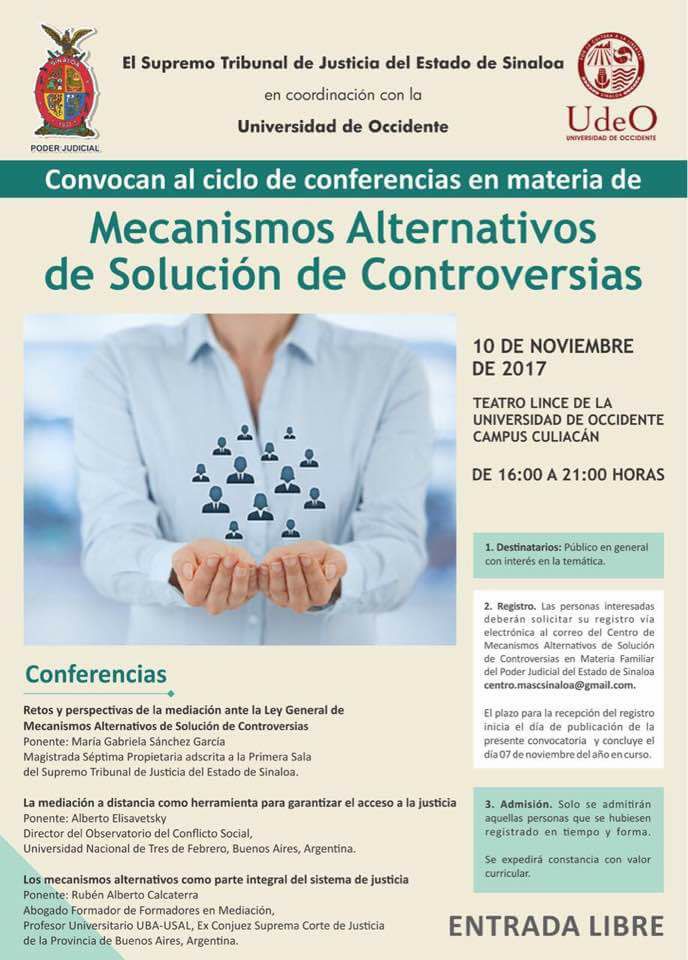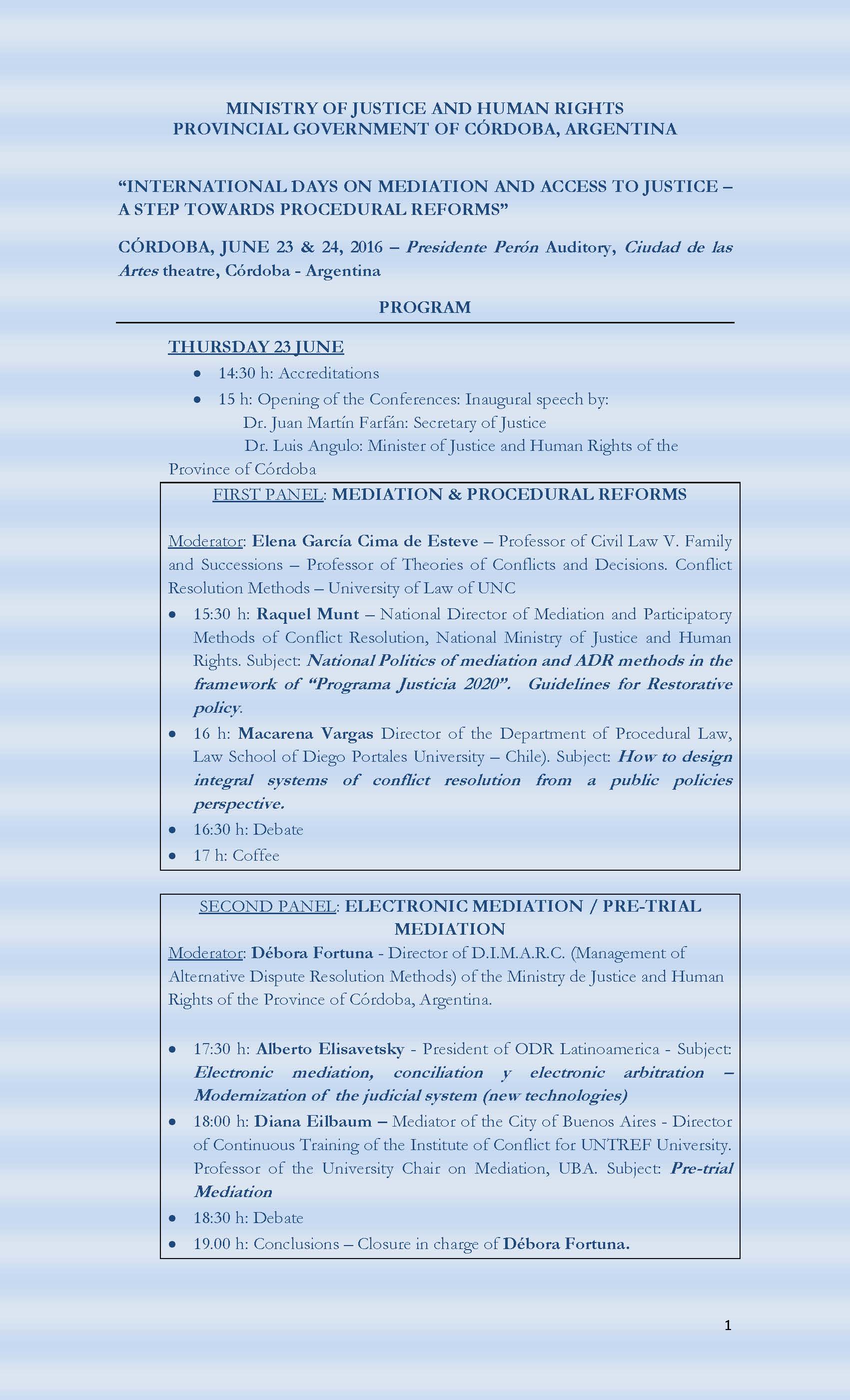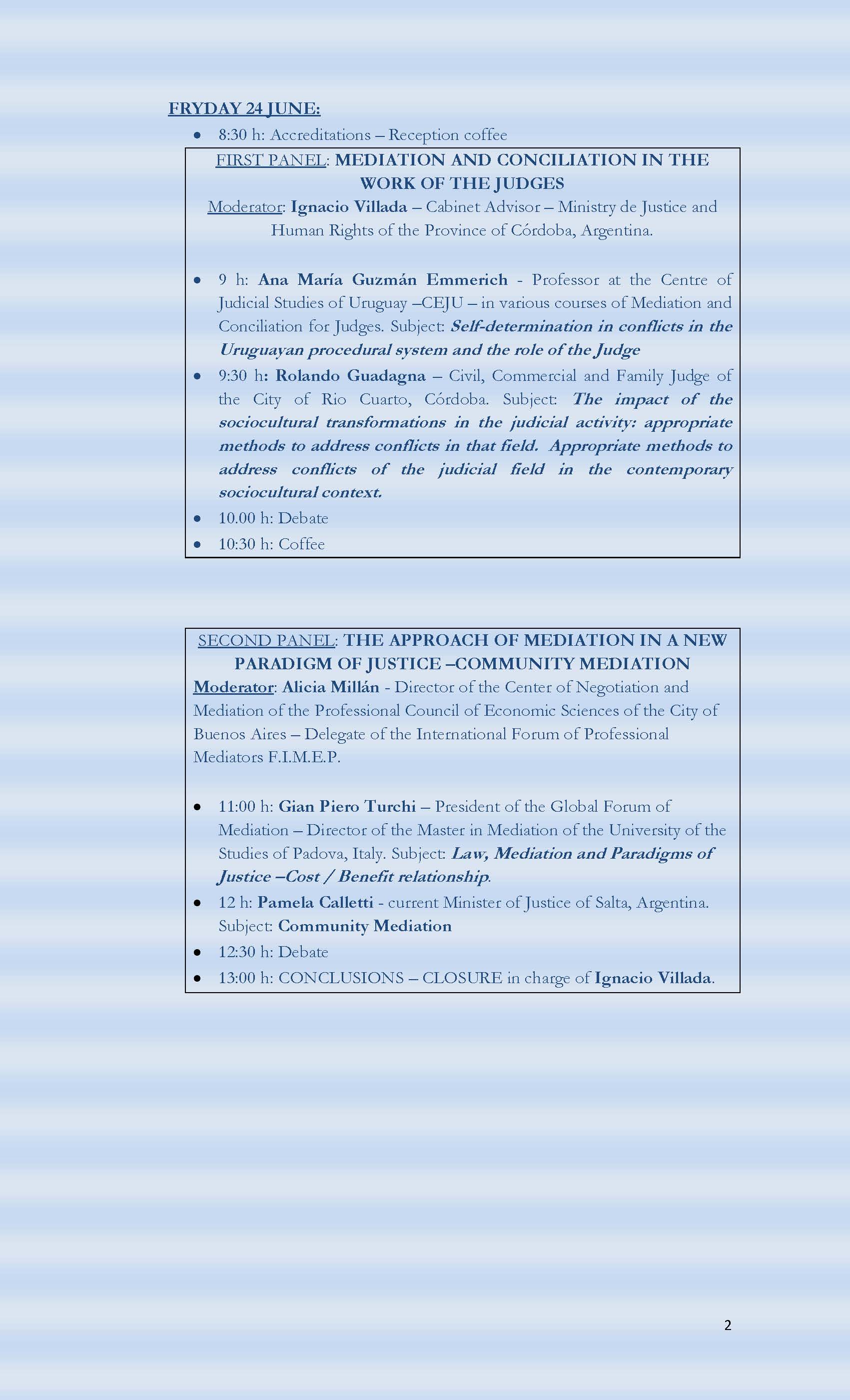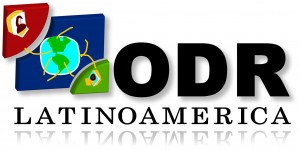
e-ADR 2015 – IV Distance World Congress in Spanish about Alternative Dispute Resolution
The virtual Congress took place between the 12th and the 15th of May 2015. The central subject of the IVth edition was The contribution of Alternative Dispute Resolution on the topic of Undocumented Immigration in Hispanic America.
The following document in Spanish contains a letter from Alberto Elisavetksy and a brief summary of the contents of the event.
We also want to share with you the links to the accademic works, the recordings of the video conferences, the debate forums and the winning works of the contest for high schools of Latin America, “Juventud Constructora de Paz ” (The Youth Builders of Peace). You’ll find the links scrolling down this document.
**
Carta de Alberto Elisavetsky, Presidente del Comité Ejecutivo e-MARC
Buenos Aires, 15 de Junio 2015
Siempre es un orgullo y una gran satisfacción para mí durante el IV Congreso Mundial a distancia en español de Métodos Apropiados de Resolución de Conflictos, ponerme en contacto con los diversos asistentes, instituciones y especialistas que brindan su aporte y que elaboran redes de conceptos y actualización. Verdaderamente, son el combustible de este evento mundial.
Gracias a ellos se genera, a lo largo del Congreso, un panorama sobre el estado de los MARC tanto en Hispanoamérica como en el mundo: a través de sus propios protagonistas y creadores, críticos y teóricos, que intervienen desde distintos puntos de vista o ámbitos de interés.
Las ediciones de e-MARC siempre han buscado colaborar y reforzar una Cultura de la Paz, de la conciliación, del acuerdo y del legítimo acceso a la Justicia. Cada año, y cada vez con más fuerza, esperamos acercarnos un poco más a nuestro cometido.
En el presente escrito compartimos con ustedes el detalle y los accesos a los trabajos destacados, a las grabaciones de las video conferencias, y a los foros de debate que han modelado este Congreso online.
Alberto Ellisavetsky
Presidente del Comité Ejecutivo e-MARC
**
E-MARC 2015 – Reseña y contenidos generales
Entre el 12 y el 15 de mayo de 2015 se llevó a cabo el IV Congreso Mundial a distancia en español de Métodos Apropiados de Resolución de Conflictos e-MARC 2015.
El e-MARC es un evento colectivo que, desde hace cuatro años, en el mes de mayo, reúne a especialistas, académicos y operadores de conflictos de América y Europa en un «espacio cibernético» para debatir y exponer, ideas, opiniones y posturas sobre temas propuestos por el Comité Organizador, integrado por prestigiosos profesionales especialistas en Métodos Apropiados de Resolución de Conflictos, y presidido por el Dr. Alberto Elisavetsky.
El Congreso tiene como objetivo el acercamiento entre personas con intereses y motivaciones afines al mundo de los Métodos Aplicados a la Resolución de Conflictos, al intercambio de información, conocimientos y puntos de vista sobre temas de interés común. El tema central, -de gran actualidad-, que atravesó el evento de 2015 fue “LA INMIGRACIÓN INDOCUMENTADA- Contribución de los MARC al abordaje de los conflictos derivados de la Inmigración Indocumentada en Hispanoamérica”.
En esta edición se incluyeron videoconferencias, foros de debates, y trabajos destacados. La novedad, la constituyó una propuesta inédita destinada a alumnos de instituciones de Educación Secundaria, de toda Latinoamérica: el Concurso “Juventud Constructora de Paz”. Este concurso buscó generar un reconocimiento a aquellos trabajos de alumnos que mejor hubiesen recogido la valoración y el significado de los medios pacíficos de resolución de conflictos en el ámbito escolar. Por ello, se invitó a los jóvenes a proponer una secuencia de acciones innovadoras, creativas y motivadoras para fomentar la resolución de conflictos mediante el uso de los MARC en el ámbito educativo.
Las VIDEOCONFERENCIAS incluyeron los siguientes temas:
- “La mediación como herramienta para la gestión de la incertidumbre generada por las migraciones: presentación de líneas guías operativas” a cargo de Michele Romanelli – ITALIA
- “Lugares de destino de los migrantes: geografías de brazos abiertos y de puertas cerradas generadoras de conflictos” a cargo de María Victoria Marún – ARGENTINA
- “La resolución electrónica de disputas en el siglo XXI” a cargo de Alberto Elisavetsky – ARGENTINA
- “La mediación y la prevención en la escuela” a cargo de Elena Baixauli Gallego -ESPAÑA
- “La identidad dialógica de los procesos migratorios” a cargo de Débora Fortuna – ARGENTINA
- “Inmigrantes en las delicias, una experiencia de pacificación social” a cargo de María Isabel Becerra – ARGENTINA
- “Conciliación extrajudicial en la contratación pública” a cargo de Rafael Medina Rospigliosi -PERÚ
- Presentación de los trabajos ganadores del concurso Juventud Constructora de Paz 2015 a cargo de María Eugenia Solé- ARGENTINA
Acceso a las grabaciones: http://e-marc.net/conferencias/
Los TRABAJOS DESTACADOS versaron sobre:
- “Conflictos y Empoderamiento pacífico en la Inmigración indocumentada”
Autor: Eduardo Andrés Sandoval Forero- Mexico
- “Habilidades y estrategias de la mediación en un mundo global”
Autoras: Rosa Perez Martell & Aura Esther Vilalta- España
- “Inmigrantes en las delicias, una experiencia de pacificación social”
Autora: María Isabel Becerra- Argentina
- “Interés superior del niño en España ante la presencia de la extranjería”
Autora: Catalina Magallanes- Argentina
- “Construcciones sociales y rumores en torno a los inmigrantes. Propuesta de abordaje”
Autora: María Eugenia Biain- Argentina
- “El derecho aplicable a los contratos internacionales: Su ámbito jurisdiccional ante conflictos iusprivatistas utilizando el comercio electrónico”
Autor: José Heriberto García Peña- Mexico
- “Justicia alternativa en México: la mediación como fórmula alternativa de solución a través de la vía y uso de los O.D.R.”
Autor: José Heriberto García Peña- Mexico
- “De la Violencia al Diálogo, del Diálogo al Conflicto.
Otro modo de Alcanzar la Paz.”
Autora: Liliana María Carbajal- Argentina
- “La importancia del contexto social en la mediación comunitaria”
Autora: María Eugenia Solé- Argentina
- “Lugares de destino de los migrantes: geografías de brazos abiertos y de puertas cerradas generadoras de conflictos familiares”
Autora: María Victoria Marún- Argentina
Acceso a los Trabajos Destacados: http://e-marc.net/category/trabajos-destacados/
Los FOROS DE DEBATE cautivaron a los participantes con las siguientes temáticas:
- “¿Podemos decir que la inmigración en el mundo actual se traduce en una muestra de la deshumanización del hombre como causa eficiente de la generación de conflictos?” Foro interactivo con lectura de noticias periodísticas liderado por Gabriela García
- “…Y la abuela parió indocumentados… (miradas de sectores sociales hacia los inmigrantes y rol del mediador” liderado por MARÍA ISABEL BECERRA
- “Mediar con el malo de la película” – Foro interactivo con observación de videos liderado por Francisco Javier Ales Sioli
- “¿Cuál es la importancia del contexto social en la Mediación comunitaria?” liderado por María Eugenia Solé
- “¿Cómo es el perfil contrario al mediador?…Porque es así y desde allí como podemos ayudarlo.” liderado por Alicia De Rivas
- “Gestión de Conflictos en empresas familiares ¿Cuál sería el momento adecuado para elaborar el protocolo en las empresas familiares?” liderado por Carlos Colussi
- “E-MARC vs. Judicatura: Si el fomento de la prosperidad social va de la mano de la procuración de justicia ¿podrán llegar a convertirse los Medios de Solución de Conflictos En Línea en una Verdadera Alternativa de Justicia para todos/as?” liderado por José Heriberto García Peña
Acceso a los Foros: http://e-marc.net/category/foros-de-debate/
Los trabajos ganadores EN EL CONCURSO JUVENTUD CONSTRUCTORA DE PAZ fueron los siguientes:
- Escuela Normal Superior dependiente de la Universidad Nacional del Sur (Bahía Blanca- Argentina) Título del trabajo: Tolerancia
- Escuela 9-001 “Gral. José de San Martín” (Gral San Martín – Mendoza- Argentina). Título del trabajo: Alguien cuando lo necesitas
- Escuela N° 4-161 “José Miguel Graneros” (Gustavo André – Lavalle – Mendoza- Argentina). Título del trabajo: Sobre la violencia en la escuela
- Instituto Cristo Rey (Río Cuarto – Córdoba-Argentina). Título del trabajo: Cambia tus palabras
Ver los trabajos del concurso: http://e-marc.net/concurso/
WEB
http://e-marc.net
President of the e-ADR Executive Comitee
Alberto Elisavetsky
– Director of ODR Latinoamérica, Embassy of Peace Mil Milenios de Paz, Peace Foundation UNESCO, Director of the Observatory of Conflict in the National University of Tres de Febrero, Argentina, Director of the Postgraduate course in Resolution of Conflicts and New Technologies in the National University of Tres de Febrero, Argentina.
General Coordinators of the Event
María Victoria Marún
-Lawyer, Mediator and Senior Professor in Legal Cience. Specialist in University Teaching, Director of the Center of Alternative Conflict Resolution of the Lawyers and Attorneys College of the 3rd Judicial Circle of Mendoza, Argentina, University Proffesor in the Pontifical Catholic University Santa María de los Buenos Aires, Postgraduate in Private Law, Instructor in School Legistalion and Conflict Resolution in Educational Institutions in DGE Mendoza and the National Ministry of Education of Argentina.
María Eugenia Solé
-Lawyer, Mediator (Holborn College Diploma in Law of Tort and Law of Contract), Graduate in Conflict Mediation and Conflict Resolution, Prejudicial Mediator, Currently assisting the Master of the VIII Promotion of the Latin American and European Master in Mediation and Negotiation of the IUKD, Institut Universitaire Kurt Bösch, Teacher, Applicant to a Postdegree in Education and TIC of the Nacional Ministry of Education of Argentina.










